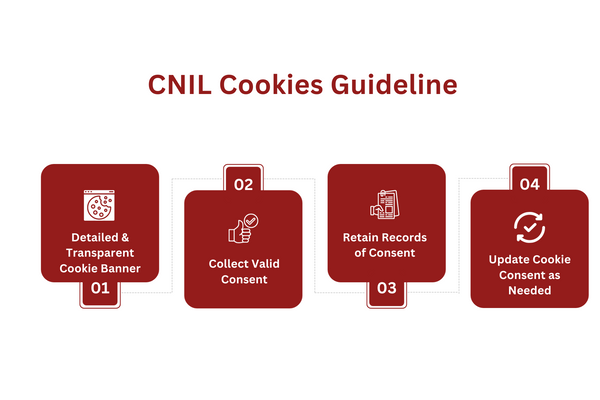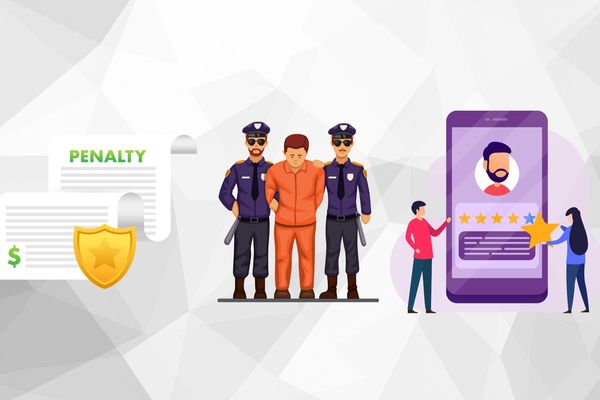
Navigating the complexities of CNIL cookies compliance can be a daunting task for businesses. This guide will explain the French Data Protection Act and the CNIL’s guidelines for cookies. It will show you how to follow the rules and keep your business compliant.
We’ll cover everything you need to know about cookie consent and data protection strategies in France. This guide isn’t just about following laws. It’s also about building trust and being open with your French consumers.
Let’s dive into the world of CNIL cookies and unlock the secrets to successful compliance.
Key Takeaways
Businesses should only collect freely given, specific, informed, and unequivocal consent. Businesses should also record this consent.
To avoid fines, legal trouble, and damage to your reputation, avoid inadequate cookie banners, using cookies without consent, and inadequate record-keeping.
To follow the changing rules, we must always check and update how we get people’s consent for cookies.
French Data Protection Act Explained
French Data Protection Act Explained.jpg

The French Data Protection Act (FDPA), enforced by CNIL, serves as a cornerstone in safeguarding personal data of French citizens. This law explains how businesses should collect, process, and protect data to respect privacy rights.
The FDPA applies to all businesses in France and businesses outside of France processing French personal information, ensuring data subject rights are respected, no matter where they process data.
The FDPA started in 1978 and was changed in 2018 to match the standards of the EU’s GDPR. This law keeps personal data safe by requiring clear data handling and consumer consent. The Act gives the CNIL the job of overseeing and making sure it is followed.
Businesses must provide French citizens with rights such as the right to access, correct, delete, and object to the processing of their data. Additionally, data must be kept safe, so if you’re processing data of vulnerable persons or using a new technology, then you must conduct a DPIA to ensure the data is safe.
Businesses must also be transparent and must give clear details about how they collect and use data in their privacy policy.
The Act focuses on getting clear and informed consent from consumers, especially regarding cookies. This is not just a legal requirement but also a measure to build trust between businesses and consumers.
Who is the CNIL?
The CNIL is a French regulatory body that started in 1978. It operates independently. Its primary mission is to ensure that data privacy law is applied effectively when personal data is collected, stored, and used.
CNIL helps people with protecting their rights and upholding businesses duties under French data protection laws. To make things easier to understand, guidelines are issued. These guidelines are similar to those for cookie compliance, and they explain complicated legal rules.
CNIL not only advises but also actively enforces compliance, especially in cases of a data breach.
They assess business practices, issue warnings, and impose sanctions if necessary. CNIL’s strategy includes investigating and responding to complaints about data misuse. The authority keeps a close watch on businesses to make sure they follow the law when dealing with data. This includes getting user consent for cookies and tracking technologies.
CNIL’s role has evolved, especially with the advancement of digital technology and the internet. In recent years, they have focused on guiding businesses through the complexities of digital data protection, including the implementation of GDPR requirements.
Businesses must obtain clear consent from consumers for cookies. Refusing cookies should be as easy as accepting them. Consumers’ data must be protected from unauthorized access.
CNIL Cookies Guideline
CNIL Cookies Guideline.png

The CNIL guidelines, detailed and specific, aim to ensure user privacy and informed consent in the digital realm. Their data practices are transparent and ethical, prioritizing consumer empowerment in digital interactions.
Detailed & Transparent Cookie Banner
The requirement for a detailed and transparent cookie banner, as outlined in the CNIL guidelines, specifically mandates that businesses include all necessary information on the banner.
This should cover the types of cookies used, their purposes, and how data subjects’ information will be utilized. The intent is to ensure consumers are fully informed before they make a decision to consent to cookie usage, upholding the principles of transparency and informed consent central to CNIL’s approach.
Additionally, there should be an accept all, reject all, and ideally a preferences option for customizable cookies.
Collect Valid Consent
In the context of collecting valid consent as per the CNIL guidelines, the requirement is for consent to be freely given, specific, informed, and unequivocal. This means that businesses must obtain consent through a clear positive act from the data subject, such as an explicit opt-in action.
Pre-ticked boxes, implied consent from inactivity or scrolling, or any form of assumed consent are not considered valid. The guidelines stress the importance of ensuring that consumers actively and knowingly agree to the use of cookies and similar tracking technologies.
It is also worth noting that collecting certain personal information relating to racial and ethnic origins, political, philosophical, religious opinions, trade union affiliations, or their health or sexual life is prohibited under the FDPA.
Retain Records of Consent
Businesses must show when and how they got user consent for cookies. This is necessary to keep records of consent, as stated in CNIL guidelines. To comply, keep records of consumers’ explicit agreement to use cookies.
These records are vital for proving compliance in case of any scrutiny or audit by CNIL. They should clearly indicate consumer actions that signify consent, such as clicking an “accept” button on a cookie banner, thereby ensuring that businesses have a verifiable trail of compliance.
Update Cookie Consent as Needed
Businesses must regularly review and adjust their cookie consent practices, as stated in the CNIL guidelines. If a business makes new cookies or changes how they use cookies, they should tell consumers and get new consent.
Regular updates ensure that consent remains valid and reflects current practices. This method makes sure consumers always choose wisely, with the latest data on how their info is used. Businesses should regularly check their cookie policies and consent methods to adjust to new cookie usage or data protection regulations.
CNIL Cookies Exemption
In addition to the general exemptions for essential cookies, the CNIL provides specific exemptions for analytics cookies under certain conditions.
Exempt Analytics Cookies:
Analytics cookies used solely for measuring the audience of a site or app and only on behalf of the web publisher may be exempt from the consent requirement. However, to qualify for this exemption, the following conditions must be met:
25-Month Data Retention Maximum: Analytics data must not be retained for more than 25 months.
13-Month Cookie Limit: The lifespan of analytics cookies should not exceed 13 months.
Limited Scope: The use of cookies must be restricted to a single site or application.
Anonymization Requirements: The last octet of IP addresses must be anonymized.
Geolocation Limitation: Geolocation data must be no more precise than the postal code level.
Opt-in Options: Businesses must set visitor protocols for cookie consent.
Prevent Data Sharing: Data sharing, especially to third-party services like Adobe Audience Manager, must be controlled and limited.
Access and Deletion Capability: Businesses should provide options for consumers to access and delete their data.
Common Reasons for Non-Compliant CNIL Cookies
Understanding the common pitfalls in CNIL cookie compliance is crucial for businesses. Non-compliance often stems from a few key areas that can be easily overlooked in the complexity of data protection regulations.
Lack of Adequate Information
One of the primary reasons for non-compliance is failing to provide sufficient information in the cookie banner. This includes not clearly explaining the types of cookies used, their purpose, and the implications of accepting them.
Using Cookies Without Consent
Many businesses fall into non-compliance by using cookies without obtaining proper consent. This means either assuming consent from passive consumer behaviors or not having a clear mechanism for consumers to opt-in.
Failure to Easily Refuse Cookies
A common issue cited by the CNIL is the difficulty consumers face in refusing cookies compared to accepting them. The process for declining cookies should be as straightforward as the process for accepting them.
Inadequate Record Keeping
Failing to keep accurate records of when and how consent was obtained is another reason for non-compliance. Businesses must be able to demonstrate compliance through clear records of consumer consent.
Penalties for Non-Compliance with the France Data Protection Act
Penalties for Non-Compliance with the France Data Protection Act.jpg

Businesses that fail to comply with the French Data Protection Act (FDPA) and CNIL’s guidelines may face significant penalties. These penalties are designed to enforce compliance and protect user data privacy.
The most direct consequence of non-compliance is financial penalties. The fines can be €300,000. In addition, for non-compliance with the GDPR, you may face an additional €20 million fine. You can also face up to five years of imprisonment.
Beyond fines, non-compliance can lead to serious reputational damage. In an era where data privacy is highly valued, businesses seen as disregarding user privacy can lose trust and loyalty.
Businesses could be sued or ordered by a court to change their practices and follow the FDPA.
Companies That Were Fined for Non-Compliant CNIL Cookies
Google: Google’s fine of 150 million euros by the CNIL was imposed due to their cookie consent practices. Google made it hard for people to refuse cookies, though saying yes is easy, breaking consent rules.
Facebook: Facebook was penalized with a 60 million euro fine. The business was fined for the same reason. Their design and interface made it hard for consumers to say no to cookies.
TikTok: TikTok’s fine of 5 million euros demonstrates the CNIL’s broader enforcement reach. The fine was given because they didn’t follow the rules about getting permission for cookies. This shows that mobile apps have to follow the rules too.
Amazon: Amazon was fined 35 million euros by the CNIL. Amazon was fined for putting cookies on people’s computers without asking, breaking CNIL rules.
Closing
After studying CNIL cookies and the French Data Protection Act, we see that understanding these rules can be difficult. However, following them is important for your business’s reputation. So, what’s next for businesses seeking to align with these guidelines?
At Captain Compliance, we offer compliance services to ensure you understand and adhere to these regulations. Our expertise in corporate compliance and data privacy laws can help you review and enhance your practices.
We can also help you set up cookie consent systems and follow legal standards. Get in touch with us for outsourced compliance solutions to ensure compliance and safeguard your business from penalties and reputational damage.
Let’s make data protection a seamless part of your business operations.
FAQs
What are the specific requirements for a consent banner under CNIL guidelines?
Consent banners must provide clear and comprehensive information about cookie usage. This includes the types of cookies, their purpose, and the option for consumers to give or withdraw consent. Ensuring your consent banner meets these requirements is crucial for CNIL compliance.
Discover detailed consent banner requirements for a deeper understanding and practical implementation strategies.
What happens if you don’t allow cookies?
If consumers don’t allow cookies, certain website functions might not work as intended. Also, businesses failing to comply with cookie regulations can face significant penalties.
Understand the implications of not allowing cookies.
What is an example of necessary cookies?
Necessary cookies include those for consumer session management, load balancing, and security purposes, like authenticating consumer logins and protecting against fraud.
Find out more about necessary cookies.
What are mandatory cookies?
Websites need mandatory cookies to work, and no permission is required from consumers. These include session management, security, and certain consumer interface customization cookies.
If you need more about the cookies policy, check out our guide here!